INTERNACIONAL
Guerra comercial: Donald Trump anunció que los aranceles serán «recíprocos» con todos los países que comercian con Estados Unidos

INTERNACIONAL
Condenaron a cinco años y medio de prisión a un conductor que chocó en Punta del Este y causó la muerte de dos modelos argentinas

Nicolás Rocca trabajó en la madrugada del 4 de enero de 2023 en el baile Open Park, en Punta del Este, como parte de una productora de eventos. Luego, fue a un after que se realizaba en una chacra de Maldonado. Su intención era levantar unos equipos musicales para alquilar, pero no tuvo éxito. Sobre la hora 13, se retiró junto a un amigo de acompañante y tres mujeres en la parte de atrás de su Volkswagen Nivus.
El camino que inició a esa hora sería fatal: Rocca chocaría contra un Ford Ka, un impacto que le causaría la muerte a las modelos también argentinas Josefina Ferrero y Micaela Trinidad. Dos años y medio después, Rocca estuvo en el juzgado de Maldonado para escuchar la condena que debería cumplir: fue sentenciado a cinco años y medio de prisión por homicidio y lesiones culpables.
La sentencia la dictó la jueza de Maldonado Gabriela Azpiroz, quien en la última audiencia del juicio reconstruyó lo que sucedió esa noche de verano en Punta del Este, de acuerdo a la crónica de El Observador.

Rocca invadió el carril en el que circulaba el auto Ford Ka y lo chocó, según la teoría del fiscal Sebastián Robles. Fue una “tragedia evitable”, consideró la jueza en la audiencia.
Ferrero, quien iba al volante del otro auto, sufrió un desnucamiento y diversas fracturas en el cráneo, la pelvis y las piernas. Trinidad, su acompañante, tuvo varias lesiones en el pecho y las piernas, que causaron su fallecimiento. Las modelos también habían ido a Open Park y luego fueron de after a una chacra. En un momento, Ferrero le dijo a su amiga para ir a buscar hielo. Trinidad y otras dos amigas la acompañaron.
Los otros tres heridos sufrieron varias fracturas, que ocasionaron secuelas físicas que continúan.

La defensa de Rocca solicitó la absolución del conductor porque entienden que no hay pruebas de que el argentino haya invadido el carril contrario. Además, creen que tampoco está probado que haya habido un exceso de velocidad o un abuso en el consumo de sustancias. Remarcaron que la conductora del otro vehículo sí había consumido un cóctel de estupefacientes.
La pericia toxicológica, sin embargo, determinó que los conductores de ambos vehículos habían consumido drogas. Rocca tenía alcohol en sangre (0,10, según lo que marcó la espirometría) y se detectó la presencia de metanfetamina y morfina, algo que fue aplicado durante la internación tras el choque. La conductora fallecida, en tanto, había consumido cocaína, metanfetamina, ketamina, éxtasis y cannabis antes de protagonizar el accidente. En uno de los vehículos, a su vez, se encontraron dos paquetes de cocaína rosa –Tusi–, aunque el acta de la policía no detectó en cuál de los dos estaba.
Para la jueza el choque se produjo por una “exclusiva responsabilidad de Rocca” ya que invadió la senda contraria, en una zona en la que está prohibido rebasar vehículos, como queda claro con la doble línea amarilla que está marcada. Azpiroz basó su argumento en las pericias de Accidentología Vial, que muestran rastros del Nivus en la senda contraria al momento del choque y comprueban que el argentino intentó un “subviraje” en la curva previa al lugar del accidente.
La jueza descartó la responsabilidad de Ferrero por su consumo: “Ambos consumieron alcohol o drogas… alcohol y drogas”.
La pena solicitada por Fiscalía era de ocho años de prisión, la máxima prevista para este tipo de delitos. Sin embargo, la jueza lo sentenció a cinco años y medio porque no tenía antecedentes y porque alcanzó un acuerdo reparatorio simbólico con un acompañante.
Aunque la defensa pidió que cumpla la medida en un régimen de libertad a prueba, la jueza determinó prisión efectiva para Rocca. Sin embargo, el argentino continuará en prisión domiciliaria nocturna hasta que la sentencia quede firme. Eduardo Sasson, defensor del condenado, adelantó a El Observador que apelarán el fallo de la jueza.
corresponsal: Desde Montevideo
INTERNACIONAL
What to know about Judge Boasberg, the Trump foe at center of DOJ complaint

NEWYou can now listen to Fox News articles!
The Justice Department on Monday accused U.S. District Judge James Boasberg of misconduct, escalating the Trump administration’s long-running feud against federal judges who have blocked or paused some of the president’s most sweeping policy priorities.
The complaint, reviewed by Fox News Digital, centers on remarks Boasberg allegedly made during a March 11 meeting of the Judicial Conference of the United States — the national policymaking body for the federal courts, which meets twice per year and is headed up by Supreme Court Chief Justice John Roberts.
During that meeting, the complaint says, Boasberg «attempted to improperly influence Chief Justice Roberts» and the roughly two dozen other federal judges at the conference by suggesting that the Trump administration could «disregard rulings of federal courts,» and trigger «a constitutional crisis.»
The complaint was sent at the direction of U.S. Attorney General Pam Bondi and signed by her chief of staff, Chad Mizelle.
APPEALS COURT BLOCKS TRUMP ADMIN’S DEPORTATION FLIGHTS IN ALIEN ENEMIES ACT IMMIGRATION SUIT
U.S. Attorney General Pam Bondi speaks alongside President Donald Trump on recent Supreme Court rulings in the briefing room at the White House on June 27, 2025 in Washington, D.C. (Joe Raedle/Getty Images)
Fox News Digital could not independently verify Boasberg’s reported remarks at the March 11 meeting, and his office did not immediately respond to a request for comment.
Officials have argued the reported remarks were an attempt to improperly prejudice or influence Roberts and said they «undermined the integrity and impartiality of the federal judiciary.»
The complaint asked, not for the first time, that Boasberg be removed from presiding over J.G.G. v. Trump, a lawsuit filed in March by lawyers for the ACLU and others on behalf of the hundreds of immigrants who were summarily deported to El Salvador’s CECOT prison under the auspices of a wartime immigration law.
The complaint — and its request to remove Boasberg from the most consequential immigration case of President Donald Trump’s second term — is certain to test the already fraught relationship between the administration and the courts.
Since Trump’s inauguration in January, senior administration officials have excoriated dozens of so-called «activist» judges who have blocked or paused some of Trump’s sweeping executive orders from taking force.
Notably, the pro-Trump legal group founded by White House aide Stephen Miller attempted to sue Roberts earlier this year for his role overseeing the U.S. Judicial Conference, arguing in a long-shot legal bid that the group’s actions went beyond the scope of what they allege are the «core functions» of the judiciary.
Boasberg, in particular, has emerged as one of Trump’s biggest public foes. On March 15, several days after he allegedly made the remarks included in the DOJ complaint, Boasberg issued a temporary restraining order seeking to block Trump’s use of a 1798 wartime-era immigration law, the Alien Enemies Act, to summarily deport hundreds of Venezuelan nationals to El Salvador.
TRUMP-ALIGNED GROUP SUES CHIEF JUSTICE JOHN ROBERTS IN EFFORT TO RESTRICT POWER OF THE COURTS
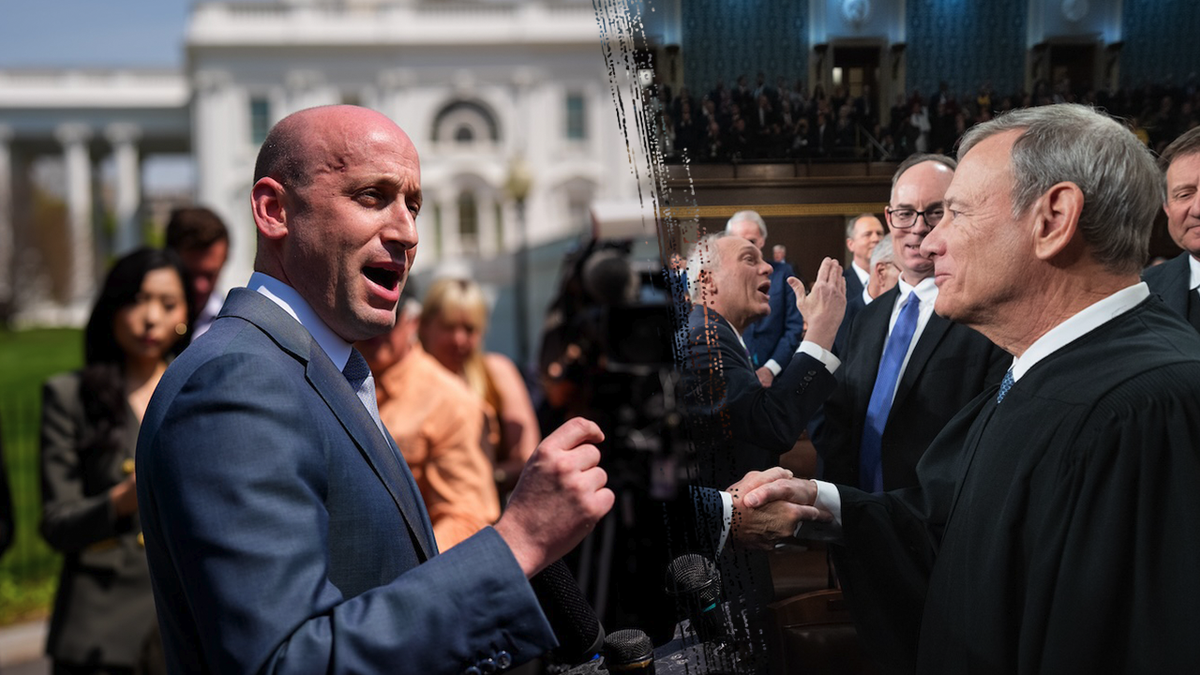
White House adviser Stephen Miller, left, and Supreme Court Chief Justice John Roberts. (Getty Images)
Boasberg ordered all planes bound for El Salvador to be «immediately» returned to U.S. soil, which did not happen, and later, ordered a new investigation to determine whether the Trump administration had complied with his orders. In April, he ruled that the court had grounds to move on possible contempt proceedings, though that ruling was stayed by a higher appeals court, which has yet to consider the matter.
His March 15 order touched off a complex legal saga that ultimately spawned dozens of deportation-related court challenges across the country — though the one brought before Boasberg was the very first — and later prompted the Supreme Court to rule, on two separate occasions, that the hurried removals had violated migrants’ due process protections under the U.S. Constitution.
100 DAYS OF INJUNCTIONS, TRIALS AND ‘TEFLON DON’: TRUMP SECOND TERM MEETS ITS BIGGEST TESTS IN COURT
However, it also placed Boasberg squarely in the crosshairs of Trump officials — including the president — as the administration moved to unleash a blitz of executive orders and target judges who tried to block them.
Their attacks have centered closely on the behavior of several judges — but no one more so than Boasberg, an Obama appointee who was originally tapped by then-President George W. Bush in 2002 to be an associate judge of the District of Columbia Superior Court.
White House press secretary Karoline Leavitt has repeatedly used her podium this year to rail against «radical left-wing judges,» accusing them of overstepping their authority and undermining presidential powers.
Trump suggested earlier this year that Boasberg could be impeached for his actions, describing the judge as a «troublemaker and agitator»— and prompting a rare public rebuke from Justice Roberts.
For some, the complaint seems to be well-timed: Boasberg ordered the Justice Department and the ACLU to court for a status hearing last week to determine the status of the 252 CECOT plaintiffs who were deported to Venezuela from El Salvador as part of a prisoner exchange with Venezuelan President Nicholas Maduro.
GORSUCH, ROBERTS SIDE WITH LEFT-LEANING SUPREME COURT JUSTICES IN IMMIGRATION RULING
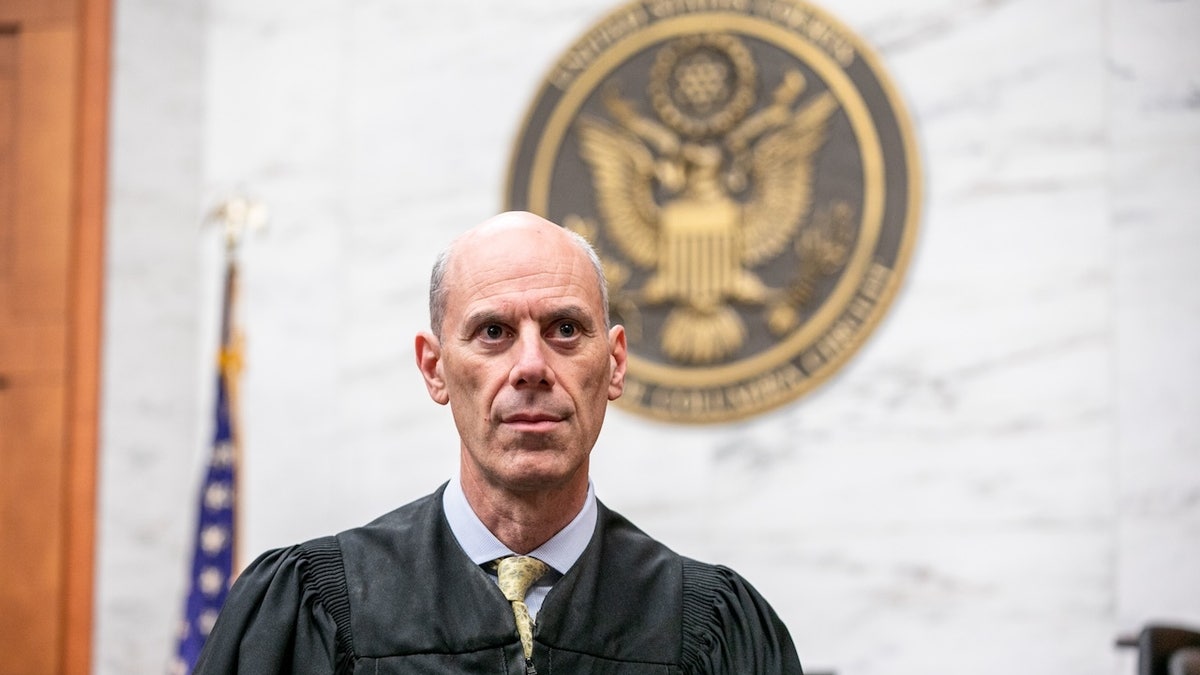
Judge James Boasberg’s March 15 order prompted a complex legal saga that has spawned dozens of deportation-related lawsuits nationwide. (Getty Images)
Boasberg ended the hearing by ordering the administration and the ACLU lawyers to submit a joint status update to the court on Thursday, Aug. 7, and to continue to do so every two weeks thereafter, as he weighs what options the court has to order relief.
When asked at a status hearing in court last week whether the Justice Department would comply with the court’s orders, DOJ lawyer Tiberius Davis said they would, «if it was a lawful order.»
Davis added that DOJ would likely seek an appeal from a higher court.
Notably, it’s not the first time the Trump administration has tried to have Boasberg removed from overseeing the case.
The Justice Department in March asked the D.C. Circuit Court of Appeals to remove Judge Boasberg from presiding over the Alien Enemies Act case and have it reassigned to another federal judge. The appeals court never took action in response to the request.
SHELTERS, JESUS, AND MISS PAC-MAN: US JUDGE GRILLS DOJ OVER TRANS POLICY IN DIZZYING LINE OF QUESTIONING
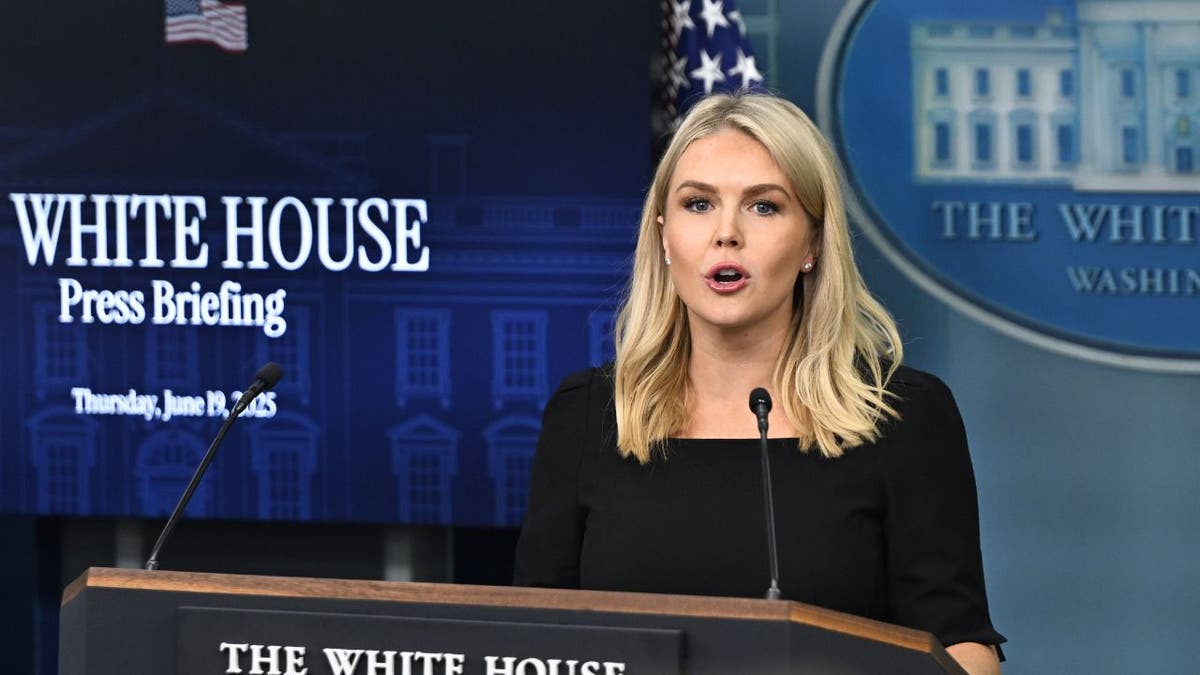
White House press secretary Karoline Leavitt speaks to reporters at a press briefing. (Celal Gunes/Anadolu via Getty Images)
The White House has repeatedly argued that lower court judges like Boasberg should not have the power to block what it calls the president’s lawful agenda — though the judges say Trump’s actions violate the law.
CLICK HERE TO GET THE FOX NEWS APP
Still, the first six months of Trump’s second term have been marked by repeated court clashes, as the administration pushes ahead with its agenda and targets those standing in its way.
That sentiment was echoed by former acting ICE Director and current border czar Tom Homan. ‘I don’t care what the judges think. I don’t care what the left thinks,» he said earlier this year in an interview. «We’re coming. Another fight. Every day.»
INTERNACIONAL
From Gaza to Greenland, Macron breaks with Trump on global flashpoints

NEWYou can now listen to Fox News articles!
From Gaza to Greenland, French President Emmanuel Macron appears to be taking increasingly bolder diplomatic stabs at President Donald Trump’s foreign policy even though such gestures don’t «carry weight» as Trump pointed out last week after the French leader declared his intention to recognize a Palestinian state.
«French Presidents from Charles de Gaulle onwards have reveled in the idea that they are a natural counterweight to U.S. foreign policy on the international stage,» Alan Mendoza, executive director of the U.K.-based Henry Jackson Society, told Fox News Digital Monday.
Charles de Gaulle was France’s long-serving leader in the 1950s and 1960s and was famously resistant to U.S. global dominance, withdrawing his country from NATO’s military command structure in a bid to increase its military independence and criticizing U.S. policies in Eastern Europe and Vietnam.
TRUMP REJECTS MACRON MOVE AS US SKIPS UN SUMMIT ON PALESTINIAN STATE
Macron met with Trump in Washington on the third anniversary of Russia’s full-scale military invasion of Ukraine. (Tasos Katopodis/Getty Images)
Such contrarian actions, Mendoza said, «have in many ways defined the French Fifth Republic, with larger-than-life characters thrusting their views onto the world stage.
«The difference now is that France matters far less globally than it did 60 years ago,» he said, adding that a weakening of the European country’s economy and its military might «means that where once de Gaulle could roar, now Macron whimpers.»
«What was once a sign of French strength and confidence now therefore looks more like a desperate attempt to escape irrelevance,» said Mendoza.
In a dramatic announcement last week, Macron said that at the United Nations General Assembly in September France intends to declare its recognition of a Palestinian state, even as Palestinian terror groups continue to battle Israel in the Gaza Strip.
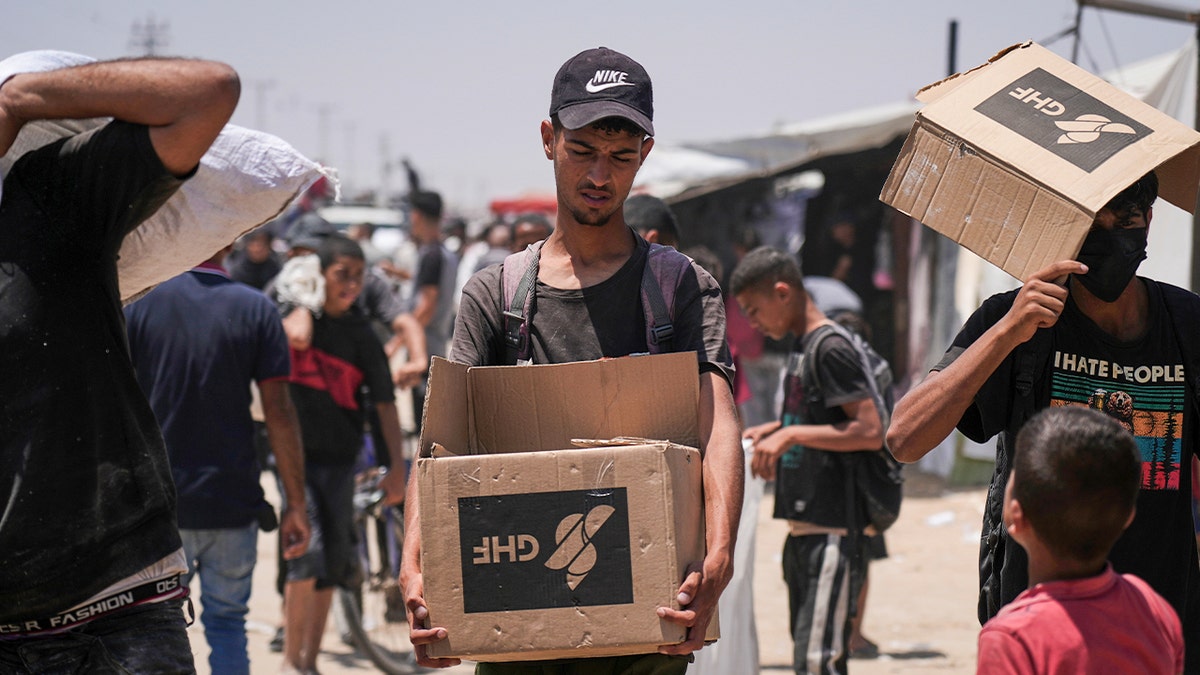
Palestinians carry bags and boxes containing food and humanitarian aid packages delivered by the Gaza Humanitarian Foundation, a U.S.-backed organization, in Rafah, southern Gaza Strip, June 16, 2025. (AP Photo/Abdel Kareem Hana)
The statement drew condemnation from Israeli Prime Minister Benjamin Netanyahu, who said such a move «rewards terror.»
It was also criticized by Secretary of State Marco Rubio, who called the decision «reckless» and «a slap in the face to the victims of October 7th.» He said the U.S. strongly rejected such a plan.
Trump merely dismissed Macron’s Gaza move, telling reporters at the White House Friday «what he says doesn’t matter.»
«He’s a very good guy. I like him, but that statement doesn’t carry weight,» the president said.
MACRON CHIDES TRUMP, CHINA OVER TRADE, UKRAINE, GAZA: POLICIES ‘WILL KILL GLOBAL ORDER’
This is not the first time the president has discounted Macron as inconsequential.
Last month, after the French president speculated about Trump’s reasons for leaving the G7 summit in Canada early and returning to Washington, the president wrote on his Truth Social platform, «Wrong! He has no idea why I am now on my way to Washington, but it certainly has nothing to do with a Cease Fire. Much bigger than that. Whether purposely or not, Emmanuel always gets it wrong. Stay Tuned!»
In the same post, Trump said Macron was «publicity seeking.»
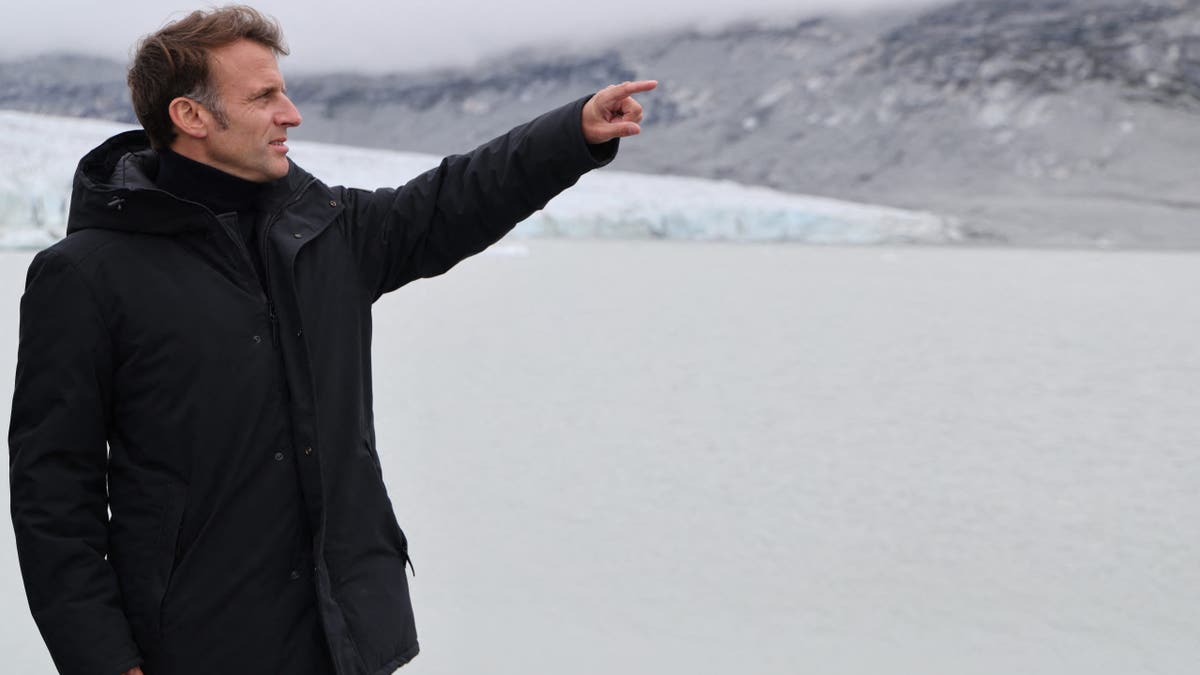
French President Emmanuel Macron gestures as he stands on the glacier Mont Nunatarsuaq during a visit to Greenland June 15, 2025. (Ludovic Marin/AFP via Getty Images)
The disparaging comments came after Macron directly contradicted Trump’s foreign policy by stopping on his way to the summit in the semi-autonomous Arctic territory of Greenland, which Trump has said he wishes to acquire.
«Greenland is not to be sold, not to be taken,» Macron declared in a diplomatic stab at Trump’s foreign policy and seemingly an attempt to rally support from other European countries to stand up to the U.S.
Asked about Trump’s ambitions for Greenland, Macron, according to Reuters, said, «I don’t think that’s what allies do. … It’s important that Denmark and the Europeans commit themselves to this territory, which has very high strategic stakes and whose territorial integrity must be respected.»
In February, the French president paid his first visit to the White House since Trump’s return to power, and while the meeting appeared to be warm, it also came amid tension over the U.S. approach to the Russia-Ukraine war.
Hours before the meeting, the U.S. voted against a United Nations resolution drafted by Ukraine and the European Union condemning Russia for its invasion.
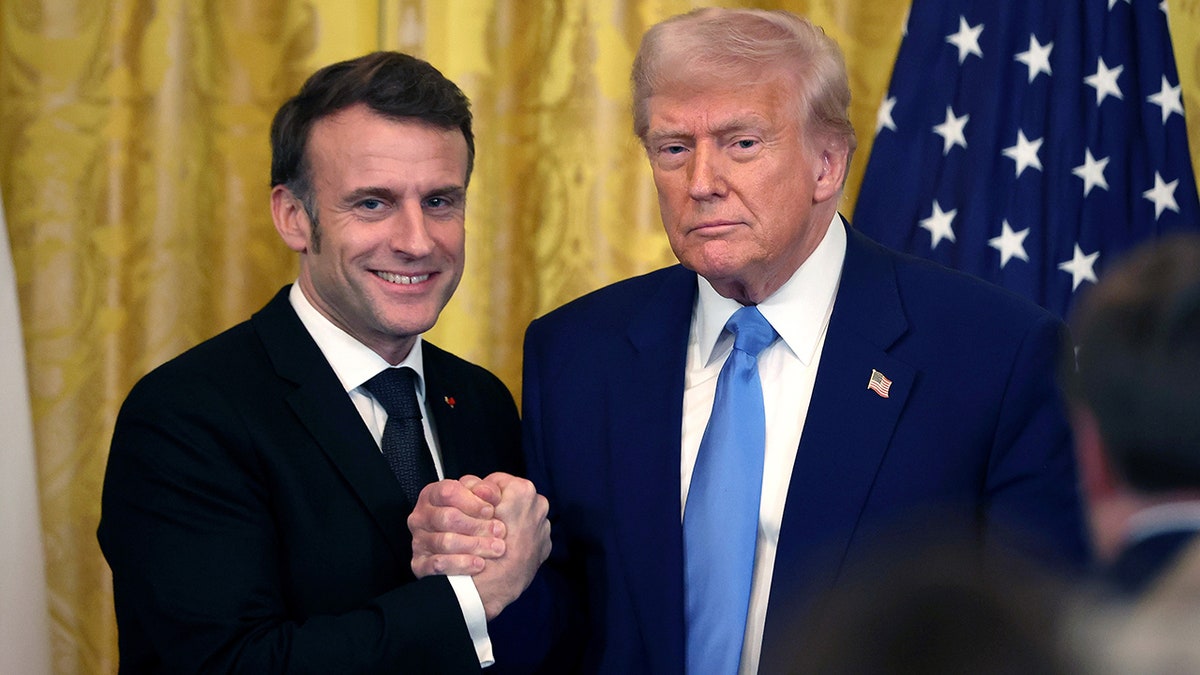
President Donald Trump and French President Emmanuel Macron shake hands during a joint news conference in the East Room at the White House Feb. 24 in Washington, D.C. (Tasos Katopodis/Getty Images)
Tensions between Macron and Trump are not personal, said Mendoza, but they are also not totally ideological.
They stem from Macron’s «desire to be relevant and to stand for something,» he said. «The French are famous contrarians, but they do it for the sake of being contrarian.»
Reuel Marc Gerecht, a resident scholar at the Foundation for Defense of Democracies, the Washington, D.C., think tank, said Macron was no «different from most European leaders. … Trump just isn’t their cup of tea.»
«Most view Trump as a convulsive, hostile force who views America’s historic relationship with Europe as transactional,» he said.
CLICK HERE TO GET THE FOX NEWS APP
«Macron, like most French leaders, defines himself in part against the U.S.,» Gerecht added, explaining that, traditionally, France and America «had a ‘mission civilisatrice’ or a competitive enlightenment mission.»
«The American way has been enormously appealing in Europe since World War II, but it has come in part at the expense of the French, who have culturally lost a lot of ground to the Anglophones, especially the Americans,» he said. «Consequently, many Frenchmen have a love-hate relationship with the U.S.»
On Macron, Gerecht added, «He is part of the French elite. They are a bright lot who punch way above their weight, but, educationally, temperamentally, they are nearly the opposite of Trump.»

 POLITICA2 días ago
POLITICA2 días agoLa confianza en el gobierno de Javier Milei creció un 4,9% en el mes de julio

 CHIMENTOS3 días ago
CHIMENTOS3 días agoEl video que publicó Wanda Nara sobre el “tamaño” de Mauro Icardi en la intimidad: “Caso cerrado, no hay maní”

 POLITICA2 días ago
POLITICA2 días ago“Tiene que ser nuestro próximo presidente”: el video con el que Javier Milei recordó a la Locomotora Olivera




































